TV Performance of the Year: Billy Porter Willed the Past into the Present with Pose
Peak TV is up to its eyeballs in complicated characters — most of them straight, white men — who lead lives of contradiction. Walter White, the mild-mannered chemistry teacher whose ego and selfishness drive him to become a murderous drug kingpin. Tony Soprano, the mob boss in therapy. Don Draper, who is also Dick Whitman, who lies and tells the truth with almost every breath. It’s a long list. But even in a landscape that includes hundreds of scripted television shows every year, it’s still depressingly rare that we get to see people who aren’t straight, white men play characters that don’t fit into one tidy box.
But in this, the Year of our Lord 2018, we got Pray Tell.
Pray Tell is a man who, as the saying goes, turns the party. To that, he’d probably grab the microphone and purr something along the lines of not turning the party, but being the party. Yet in the hands of creators Ryan Murphy, Brad Falchuk, and Steven Canals — and especially in the hands of a Tony-winning Broadway vet named Billy Porter — he’s much more than the party. He’s a person fighting every day to survive, to live life, to maybe even sometimes be happy. “That’s what Pose does,” Porter tells us by phone, the week after he received his first Golden Globe nomination. “It shows you the fabulousness, and then it goes into the human being … This is what I’ve dreamed of for 30 years.”
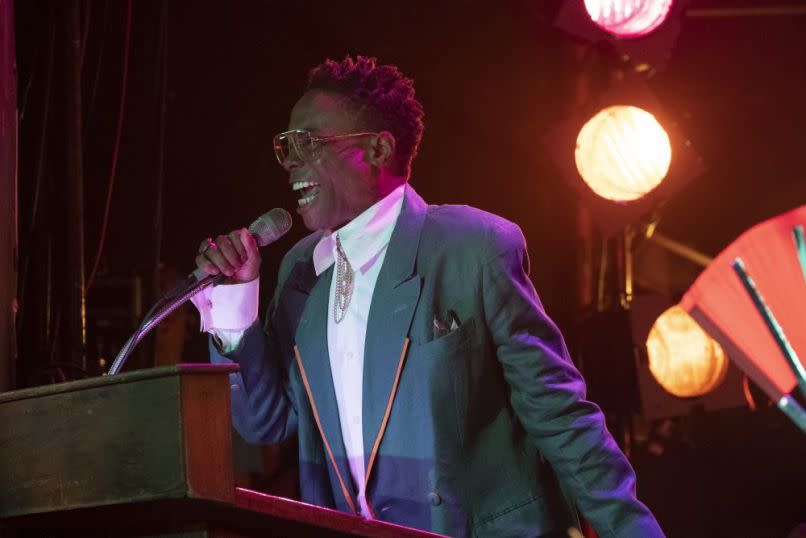
Pose (FX)
FX’s groundbreaking Pose pulls back the curtain — a fabulous curtain — on New York’s ballroom scene in the 1980s, a thriving community for queer and trans people, especially people of color, which found ways to celebrate and champion life even as the AIDS crisis continued unabated. The disease, as it’s often referred to in the show, was a daily fact of life, something to be ignored, fought, or endured. The party isn’t Pray Tell. The disease isn’t Pray Tell. He is neither showman nor tragic figure, and he is both.
“He’s fearless,” Pose co-creator and writer Steven Canals said of Porter when we spoke with him in Los Angeles this summer. “He’s not afraid to take risks, to be messy and complicated. He’s willing to do the full spectrum of emotion. Ego can get in the way for all of us, not just for actors — what you sound like, what you look like — and without meaning to, you can stifle yourself. But he just goes for it.”.
Porter’s is the year’s finest performance (and that’s really saying something). It’s as vivid and exuberant as the gowns Pray Tell designs for his chosen family. It bites with a sharpness that lingers, unshakable as the winter wind that careens off the ocean and tears across a city pier. It’s as soft as the ballad and triumphant as a note belted loud and long.
In short, Pray Tell is a person, not a type, and Billy Porter is an artist, now a star.
Consequence of Sound spoke with Porter on the heels of that Golden Globe nomination about what it’s like to step into this role, where we’re at as a country and a culture, Pray Tell’s musical and sartorial selections, and what that incredible name might say about the character who bears it.
This interview has been lightly edited and condensed for clarity.
Congratulations on your Golden Globe nomination! That must have been quite a morning.
Yes! It was very frustrating. These things are a lot for your nerves. I’m the kind of person that doesn’t really pay attention to stuff like that, in terms of when it’s happening, but [when you’re a possible nominee], everybody around you does. I would love to be in a world where I don’t know when they’re being announced and I can just wake up to a surprise or not. But the night before, everybody was like, “8:05! 8:05 tomorrow!”
I was in Atlanta working on a movie, so luckily I was working, but I did have my phone in my back pocket on silent vibrate, and I thought, “well, from 8:05 to 8:40, if my phone starts buzzing, it’s good news. And if it doesn’t start buzzing, I’m down here in Atlanta, making a movie with Tiffany Haddish, Salma Hayek, and Rose Byrne. So I’m okay anyway. And I was literally in the middle of a scene, and my phone started buzzing.
And then it kept buzzing, and it kept buzzing, and it kept buzzing. And I was like, okay, so I got it. I got the nomination, or people are calling to say sorry that I didn’t get the nomination. And then they said cut, and one of the producers came out and said, “Before we go on, we have to just say, there’s a Golden Globe nominee in our midst.”
It was amazing. It can’t be any better than that.
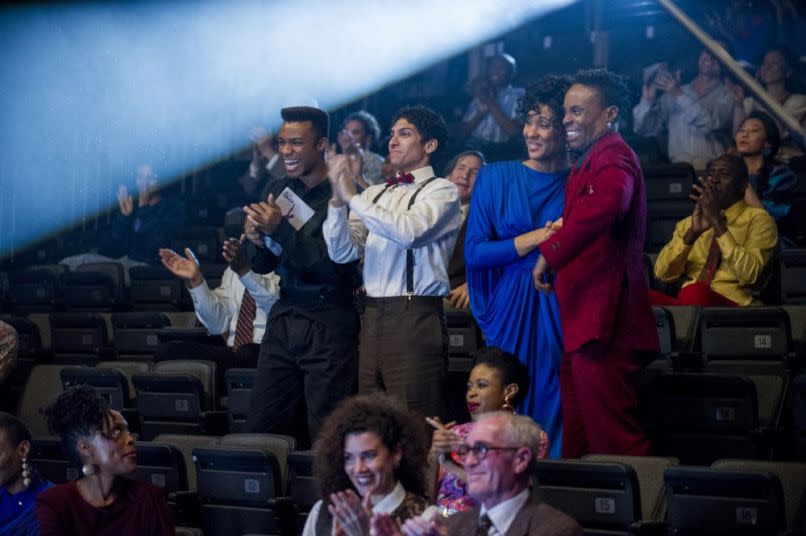
Pose (FX)
And then back to work!
Exactly, back at work. Awards don’t pay the bills, bitches!
What is the relationship between the Pray Tell that we see on stage in and in emcee mode, and the one that we see offstage?
I’m glad you’re asking [about that]. From the minute I got into this business, I understood that me being a gay man, me being an out gay man, me having an explosive energy — flamboyant, as many people like to refer to it, very often used as a pejorative — I found myself in the middle of a pigeonhole that I had no knowledge of putting myself in.
I was simply already in it. I could sing, I could stop the show, and I’m huge and flamboyant. So, that’s what you do. That’s the box you’re in. But when it comes time to tell your story as a human being? “We don’t want to hear that. Go shut the fuck up somewhere.” Right?
So my journey in the last 30 years has been about holding onto the thing that I do, not being ashamed of that fabulousness that I have — because who doesn’t want to be fabulous? Who doesn’t want to stop shows? Who doesn’t want to be that person? — But simultaneously to demand the at-what-cost story behind it.
At what cost do I show up every day to entertain you? What’s going on in my life when I’m showing up with this patina of joy and happiness? To show up and entertain for your benefit? What’s going on with me? That’s Pray Tell. That’s what Pose does. It shows you the fabulousness and then it goes into the human being. Couldn’t be better. This is what I’ve dreamed of for 30 years.
We see that tension comes to life in the first half of “Love is the Message” [the sixth episode of Pose]. Watching Pray Tell go through the motions and still be incredibly entertaining and vivacious, while obviously struggling and obviously going through something was fascinating. What were those scenes like to play?
Well, those things were just an extension of my life. I came out in 1985. I started coming to New York in 1987. I lost a lot of people, but we had to choose life anyway. What else was it going to be? We had to watch our friends literally die in the streets, with nobody around us caring enough to even take us into the hospital, to let us die with dignity. We were inside of a plague, and Reagan never mentioned the word. Never said the word. So this show, this space that I get to vibrate in, it feels very… [pause]
Many of us have survivor’s guilt. Many of us who survived, we have survivor’s guilt, and we don’t know we have it. We have PTSD. We didn’t know we had it. I got so many calls from people, friends of mine from that era, who said, “When I watched the show, I realized that I had not mourned.” Because the pill came and everybody moved on. And we in America, we in this culture, love to forget about the bad things. “Oh, slavery, that’s over.” “Civil rights? Oh, there’s no racism anymore.” We like to gloss over that stuff, but those who don’t know their history are doomed to repeat it.
And that’s why we’re in the middle of the shit that we’re in right now. Because people don’t know! And that wasn’t even that long ago. I talk to little baby gays, and they’re like, “Isn’t that a little over the top?” I was watching The Normal Heart, and men are running through the streets holding their dying boyfriends like the Pietá, and a twenty-year-old turned to me and said, “Isn’t that a little over the top?
They don’t even know! We lived through a plague. A real plague. That’s what this show gets to remind people of, and therefore, creates a conversation so we can start healing.
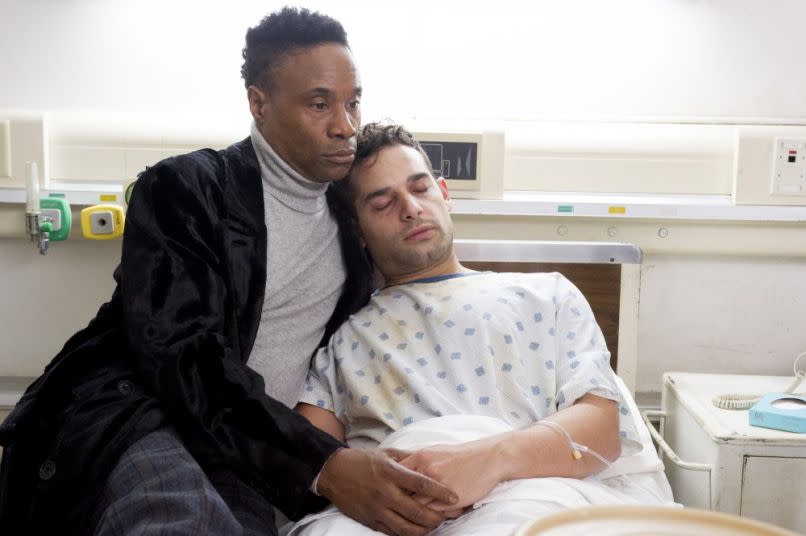
Pose (FX)
This series exists in such a specific time and place, and in a perfect world, it would be a very moving historical document with absolutely no resonance with the present, but rights are being rolled back, people are losing their jobs, their lives—
Right. And people think that words don’t matter. I’m going to get into this Kevin Hart thing for just a second. Because it’s not about you having a joke. That’s not what it’s about. I’ve seen people and I’ve heard people who are not homophobic who do gay jokes. And you can tell that they’re not homophobic.
I think Monique, a long time ago, she did a joke about butt sex. It was a whole thing about butt sex and “the gays,” you know. And the punchline was something like, “Yeah, but don’t knock it till you try it!” And then we must stop the person who we know is using a joke, but she’s not a homophobic person. She’s not saying, “If I come home and my four-year-old son is playing with a baby doll house, I’m gonna break it over his head and tell him it’s gay.”
That crosses a line. Because that allows your fans to think that [you can] hit somebody because you don’t like them. You don’t like their sexuality, “so I can bash you in the head.” We’re not doing that anymore. And that is what Pose challenges. That’s what we’re saying. Y’all don’t get to have that language no more without somebody on the other side challenging that. You had long enough to spew that darkness into the world without somebody on the other side shedding some light on it. We’re done with that.
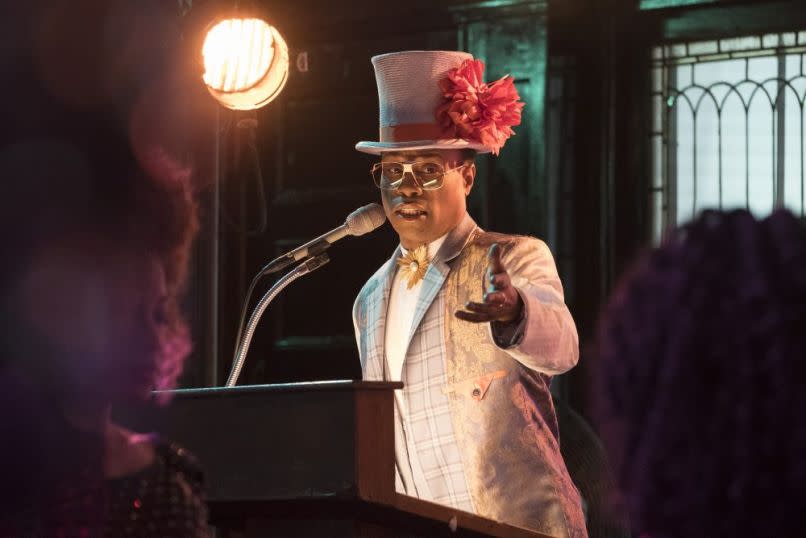
Pose (FX)
Oh, man, you’re making me want to stand up and march into the streets this second, but I have to keep interviewing you.
It’s march-into-the-streets time! We have an administration that thinks that it can, with a sentence, erase a whole group of people. And we’re not going to do anything about it? Transgender people don’t exist? Fuck that. I say to Kevin Hart, and I say to D.L. Hughley, I say to those people who think that they don’t need to apologize for shit and dig their heels in their toxic masculinity: But you want your rights! You want people to stop shooting your children in the back? But yet still, you turn around and oppress other people the same way you’re being oppressed.
Fuck that. Fuck you. We’re done.
Pose is so powerful partially because righteous in that way, there’s tragedy and there’s rage, but also because it’s made with such obvious love. It’s such a warm, safe place, you want to crawl inside it and just stay there with these people and the families that they create.
That’s what it’s about, it’s about family.
Both those elements of Pose are reflected in the cabaret scene.
For me, it was beautiful. When the AIDS crisis was happening, those of us in show business, we felt so helpless. I’m not a doctor. I’m not a scientist, I’m not a lawmaker, not a policy person. So what do you do? How do you fix it? How do you change it? And the cabaret community and the Broadway community, in the midst of that, came up pulled themselves together.
There was this organization called Hearts & Voices. It was simple. When you go to a cabaret or a piano bar, you’re dealing with people who are in the business but don’t have a job at the time, and they come, and they sing through the evening. That community pulled together Hearts & Voices. Every hospital had a weekly cabaret for an hour. All of the hospitals in New York had their own once-a-week thing.
And these people would just sign up and show up, three or four singers, and you’d show up with your audition book, there’d be a piano player, and you’d just sing for the sick people for an hour. To bring them some joy, to bring them some life to remind them that they are loved. So when I saw that in the script, it was instinctive.
Did the writers choose your songs, “For All We Know” and “Home,” or did you and Mj Rodriguez [who plays Blanca] have input?
I chose “For All We Know,” but “Home” was in the script. Donny Hathaway is life. It had to be the Donny Hathaway version.
“Home” speaks to the theme of family that we were just talking about, and that’s underlined in the moment when Pray Tell gets up to stand with his sister.
That was very emotional. There was really very little acting, because you have the real shit that sitting right there. When [Blanca] looked in that girl in the eyes — they made her up to look like she’s dying. So she was dying, and the fear. So all you have to be here and be present in that moment.
For me, it was one of those times where I felt the spirit of my friends all over me. I felt the spirit of the people that I lost saying, “Thank you. Thank you for telling our story. Keep on telling it. That’s the message I got, the spiritual message I felt when we were doing that scene, and I knew how powerful it was going to be when we were doing it.
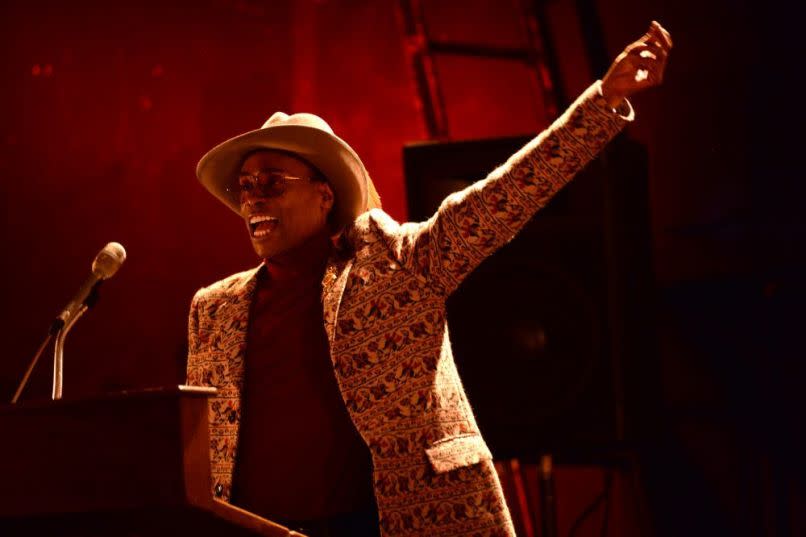
Pose (FX)
If you’ll forgive the total tonal shift, one of the very first things we hear Pray Tell say is, “Cry more, pee less.” Do you agree with that advice?
[Laughs.] Yeah. Especially with men, there’s this idea that vulnerability is a weakness. And that has gotten us into a lot of trouble. That’s why we have so many of these horrible things, because nobody’s interested in being vulnerable. Everybody wants to pop that chest out.
When you can get to the root of your fear, sometimes that makes you cry, and that’s okay. Once you once you own it, you can move through it. I have a song called “Love the Pain Away,” and “you got to feel it to heal it” is inside of the hook.
As a costume design nerd, I can’t help but ask you about Pray Tell’s clothing, both what he wears and what he makes for others. What incredible design. How do they affect your performance?
Costumes are everything. In film, it’s really the last big moment. For me, my characters come to life when I’m in the clothes. And I always wear the clothes, the clothes do not wear me! I’m not afraid to wear anything.
Lou Eyrich [Ryan Murphy’s Emmy-winning costume designer] and myself, you know, she had vision boards, I walked in, and Ryan Murphy said, “I want to create a space where Pray Tell / Billy is a fashion icon. I want people to be talking about his fashion, whether about the show or about he himself. He’s a fashion person, let’s make him a fashion icon on the show, so that can carry through to his real life.” And I’m so glad! Because I love clothes. I love it, I love it, I love it. It’s one of my favorite things.
So [Lou and I] get to do [create it] together. I’m pretty fearless. I’ll wear anything, and that unleashes a designer. Their brain unleashes and unlocks in a way. They show up with shit, and you’re like, “Yes! That! Uh-huh!” Costume people love me because I’ll wear anything. Anything that’s fabulous.
One last question: What does the name Pray Tell say about this person, about who he is and how he operates in the world?
Wow. [pause] Well. It’s very specific. It’s very memorable. If a person who has something to say, and has no problem saying it. That’s all I got.

